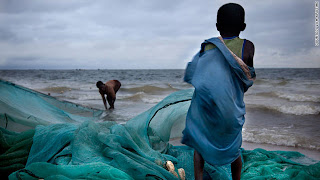If you have heard about Barack Obama declaring January 2012 National Slavery and Human Trafficking Prevention Month, you might be confused about why our president would be concerned with such an issue. After all, slavery ended in the U.S. after the Civil War and is only occurring in remote third-world countries nowadays, right? Sadly, that is not the case. Slavery, defined by CNN as "when one person completely controls another person, using violence or the threat of violence to maintain that control, exploits them economically, pays them nothing and they cannot walk away," is a very real problem, even in present-day America; it's just that the media goes out of its way to hide the upsetting truth, using euphemisms such as "debt bondage," "bondage labor," "attached labor," "restavec," "forced labor," and "indentured servitude."
The legal definition for "chattel slavery" is surprisingly loose: "a civil relationship in which one person has absolute power over the life, fortune, and liberty of another." It would be nice if such situations were rare or nonexistent, but they are more common than most realize, with over 27 million slaves in the world today, mostly located in India and Africa, though thousands are trafficked into the U.S. annually. To truly appreciate what a large number that is, consider that there are about 32 million seconds in a year. That means that if a person were to meet one slave every second, he would spend about seven eighths of a year meeting slaves. How much do these slaves cost, you ask? About ninety dollars in average. Ninety dollars. Human beings can officially be bought for less than designer clothing, smart phones and gaming consoles. If that's not disheartening information, then I don't know what is.
Want an example of something these slaves do, the purpose they serve? Well, chocolate is made from the labor of child slaves. As much as we all love chocolate, it is far from necessary for survival. Some of these children have never even eaten chocolate before; some don't even know what chocolate is. That's right, kids are being forced to make a product they're not even familiar with. Think about that the next time you take a bite into that candy bar that you could afford to waste money on. I'm not saying eating chocolate is inherently bad, only that we need to understand just how lucky we are to be so privileged, and how wrong is is to value junk food over the freedom of innocent youth.
Despite these horrifying facts, it is important that we don't lose hope. Nothing great was ever achieved without effort, but if we band together to spread the word, surely we can put an end to slavery. I like to believe that the majority of people in the world are not sick, sadistic individuals who think slavery is right, so if the public is educated, it should be very possible to overthrow those who are okay with the ownership of one's equals. All we can do is try.
Pictures courtesy of Free the Slaves, Lisa Kristine, and Daniel Rosenthal, respectively.
To learn more about slavery and the battle to end it, please visit the following websites:
http://www.thecnnfreedomproject.blogs.cnn.com
http://www.freetheslaves.net
http://www.endslaverynow.com


